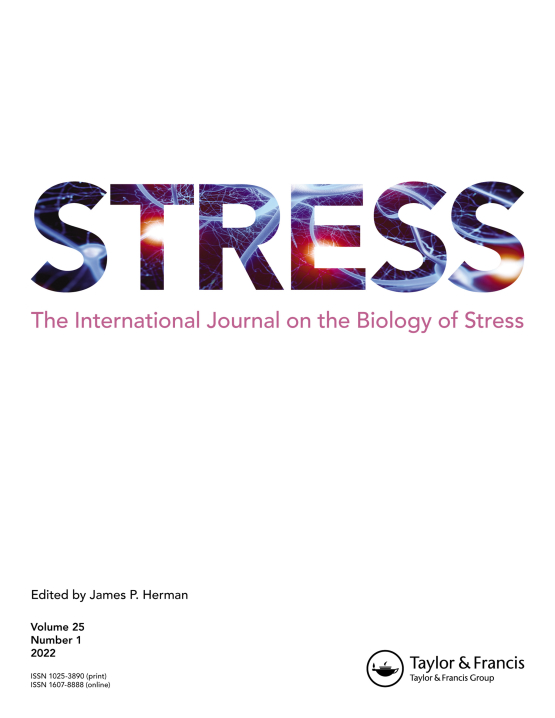Submit a Manuscript to the Journal
Stress
For an Article Collection on
Brain Health and Body Physiology Under Stress – The Allostatic Load Link
Manuscript deadline


Article collection guest advisor(s)
Prof. Zoltan Sarnyai,
James Cook University, Townsville, Queensland, Australia
zoltan.sarnyai@jcu.edu.au
Ms. Sabine Finlay,
James Cook University, Townsville, Queensland, Australia
sabine.finlay1@my.jcu.edu.au
Brain Health and Body Physiology Under Stress – The Allostatic Load Link
Increased allostatic load through the chronic activation of allostatic systems (neural, endocrine, metabolic, cardiovascular, and immune) leads to maladaptive recalibrations that results in increased “wear and tear” of the organism’s physiological systems and eventually, it’s structural integrity. This long-term functional and/or structural dysregulation and breakdown, termed allostatic overload, arises as the result of chronic allostatic load, leading to accelerated aging, disease onset, and progression, and increased early mortality risk. The allostatic load concept has been investigated in several areas, such as psychiatry, cardiovascular, metabolic and brain health, cancer, adverse childhood experiences, and work stress.
The allostatic load concept may be useful for evaluating the impact of chronic stress at a systems level. This approach can be applied to the early intervention of the core pathophysiology as well as systemic comorbidities that are common among those with non-communicable diseases and psychiatric conditions. Applying the allostatic load index, a cumulative measure of stress-related muti-system dysregulation, could potentially give medical professionals an insight into early diagnosis, treatment response, disease staging or as a predictor of comorbidities in patients with non-communicable diseases.
This Article Collection is aiming for submissions focusing on chronic stress and allostatic load in the context of mental health conditions or systemic, chronic, non-communicable disorders, including metabolic syndrome, cardiovascular and immune/inflammatory disorders. Submissions that connect systemic comorbidities with psychiatric disorders are welcome. Both preclinical studies using relevant animal models and human clinical studies will be included in the form of original research reports, systematic and narrative reviews.
Prof. Zoltan Sarnyai is a medically trained psychiatric neuroscientist and a leading expert in preclinical and clinical stress research. He was trained at Harvard Medical School and at the Rockefeller University and held faculty appointment at the University of Cambridge before establishing his lab in Australia. He has published over 150 research articles and book chapters and serves on the editorial boards of several neuroscience journals. He is currently the Director of the Margaret Roderick Centre for Mental Health Research at James Cook University, Australia.
Ms. Sabine Finlay is currently a PhD student at James Cook University, Australia specializing in allostatic load and psychiatry, exploring the physiological impacts of chronic stress on mental health. Alongside their doctoral studies, she works as a Clinical Research Project Manager, overseeing and coordinating the clinical research project “Nutritional Intervention in Schizophrenia and Bipolar Disorder” in Townsville, Australia. With a strong background and interest in clinical research, Sabine aims to bridge the gap between biological processes and psychiatric conditions, contributing to the development of more effective treatments for mental health disorders.
All manuscripts submitted to this Article Collection will undergo a full peer-review; the Guest Advisor for this Collection will not be handling the manuscripts (unless they are an Editorial Board member).
This journal accepts the following article types: Original Articles, Short Communications, Review Articles, Perspectives, Letters to the Editor, Commentaries and Book Reviews. Please review the journal scope and author submission instructions prior to submitting a manuscript.
While submitting, please be sure to select the Article Collection “Brain Health and Body Physiology Under Stress – The Allostatic Load Link” from the drop-down menu in the submission system. Failure to select the appropriate Article Collection can result in delays.
Please contact Sam Zhang at sam.zhang@taylorandfrancis.com with any queries and discount codes regarding this Article Collection.
Benefits of publishing open access within Taylor & Francis
Global marketing and publicity, ensuring your research reaches the people you want it to.
Article Collections bring together the latest research on hot topics from influential researchers across the globe.
Rigorous peer review for every open access article.
Rapid online publication allowing you to share your work quickly.
Submission Instructions
All manuscripts submitted to this Article Collection will undergo desk assessment and peer-review as part of our standard editorial process. Guest Advisors for this collection will not be involved in peer-reviewing manuscripts unless they are an existing member of the Editorial Board. Please review the journal Aims and Scope and author submission instructions prior to submitting a manuscript.
